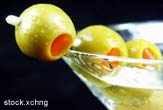Hangover-free Buzz: Star Trek's Synthehol Now Possible

Get the world’s most fascinating discoveries delivered straight to your inbox.
You are now subscribed
Your newsletter sign-up was successful
Want to add more newsletters?

Delivered Daily
Daily Newsletter
Sign up for the latest discoveries, groundbreaking research and fascinating breakthroughs that impact you and the wider world direct to your inbox.

Once a week
Life's Little Mysteries
Feed your curiosity with an exclusive mystery every week, solved with science and delivered direct to your inbox before it's seen anywhere else.

Once a week
How It Works
Sign up to our free science & technology newsletter for your weekly fix of fascinating articles, quick quizzes, amazing images, and more

Delivered daily
Space.com Newsletter
Breaking space news, the latest updates on rocket launches, skywatching events and more!

Once a month
Watch This Space
Sign up to our monthly entertainment newsletter to keep up with all our coverage of the latest sci-fi and space movies, tv shows, games and books.

Once a week
Night Sky This Week
Discover this week's must-see night sky events, moon phases, and stunning astrophotos. Sign up for our skywatching newsletter and explore the universe with us!
Join the club
Get full access to premium articles, exclusive features and a growing list of member rewards.
Synthehol is a science-fictional substitute for alcohol that appears on the Star Trek:The Next Generation television series. It allows drinkers to experience all of the enjoyable, intoxicating effects of alcohol without unpleasant side-effects like hangovers.
Professor David Nutt, a psychopharmacologist at the University of Bristol in the UK, believes that there is no scientific reason why it cannot be created now.
Alcohol works in the brain mainly by latching onto signalling molecules called GABA-A receptors. There are dozens of subtypes of these; not all of them are associated with specific effects of alcohol. For example, memory loss may occur in conjuction with drinking because alcohol binds to alpha-5, a GABA-A receptor subtype in the hippocampus.
Professor Nutt suggests that if molecules that bind poorly to the bad subtypes like alpha-5 could be developed, it would be possible to retain the pleasant effects of alcohol without the bad side-effects.
Some "partial agonists" of GABA-A receptors already exist; bretazenil and pagoclone were developed as anti-anxiety drugs. These drug molecules are instantly reversible by the flumazenil, used as an antidote to overdoses of tranquillisers.
Perhaps most interesting is the idea that problems like cirrhosis of the liver could be eliminated by altering the composition of alcoholic beverages. Nutt will publish this idea in the Journal of Psychopharmacology next month.
Science-fictional-beverage enthusiasts should take a look at Programmable Soda, an amazing prediction by UK sf writer Jeff Noon. Roboticists with an interest in alcohol should read Methanol-Powered Robot Muscles - Bend It Like Bender.
Get the world’s most fascinating discoveries delivered straight to your inbox.
Read the original article here; for the sf part, read more about synthehol. Thanks to Greg for providing the story tip and the sf reference.
(This Science Fiction in the News story used with permission from Technovelgy.com - where science meets fiction.)
 Live Science Plus
Live Science Plus










